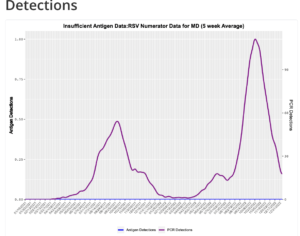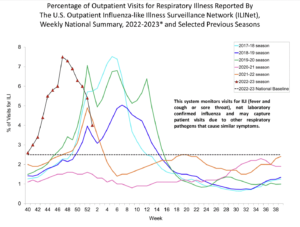
Respiratory Viral Season – is it over yet?!
By: Dr. Joseph Mechak
This year’s respiratory viral season has been unlike any other in recent memory. A few things that have set this respiratory season apart are that it was:
Early – Many viruses, but Flu and RSV in particular, came earlier than usual this year. RSV season is classically from December to March, but we saw it hit our area hard from late September through November. Flu, similarly, came a few months earlier than typical. Case numbers of both (fingers crossed) seem to be dropping through December and January but it’s tough to know for certain if they are truly fizzling out or if they will linger through the winter – more on this below.
Severe – We have seen more hospitalizations and severe illness from bad actors like the Flu and RSV than any year in recent memory. In addition, other common viruses like Rhinovirus and Enterovirus, which are typically more mild, have also led to more substantial illness and hospitalizations this year.
Non-discriminatory – You’ve noticed that your older children and you as parents have gotten sick more often than usual this year. You may have also noticed that your symptoms worse and have lingered longer than normal. We suspect that this is due to what is called an ‘immunity gap.’ Our immune system has not been challenged over the past 2-3 years. With less exposure to these common viruses our immunity has waned and is less prepared to stave off these infection. This leads to more frequent illness and the need for a more robust immune response to each virus which causes more fatigue, fever, and ‘the feel bads.’
Unpredictable – This respiratory season has truly been unlike any other, making it difficult to know what’s to come… There are a number of hopeful signs that the respiratory season is starting to fizzle, but with the unpredictability we have seen this year, it is important to stay vigilant.
So, when will it end?! Sorry to say that it is difficult know but here are a few trends we are following now:
- RSV – Good news! Cases of RSV are falling… and fast. You can see from the graph below that RSV peaked in our area in October and that cases have been quickly declining over the past few months. We are hopeful, but not certain, that this means RSV season is slowing down for good.
-
 RSV cases by week 2022-2023
RSV cases by week 2022-2023 - Flu A – Good News! Cases of Influenza A are also falling. Flu A hit hard in November and cases have been falling over the past few weeks Again, we hope this means that Flu A season is coming to a close.
-

Flu cases by year – Red Triangles indicate 2022-2023 season
- Flu B – Too soon to know: We have not seen much Influenza B yet. There are typically two strains of Influenza each year that circulate more-or-less independently. The fact that we have not seen much Influenza B yet this year could be good news in that Flu B may not be a big player this year. This may also be bad news in that the Flu B outbreak is yet to come. Only time will tell. The Flu shot protects against both Flu A and Flu B. We continue to strongly recommend that everyone > 6 months old get their flu shot – even if your family already had Flu A – to provide protection against this potential Flu B outbreak.
- COVID-19 – Too soon to know: We have seen a very modest uptick in COVID-19 cases in our areas over the first few weeks of January. This is likely driven by the newest Omicron variant XBB.1.5 – also called the Kraken variant. This variant is the most infectious to date and the vaccine does not provide robust protection against infection. Thankfully, however, this variant does not seem to be more virulent or severe than past variants and the bivalent vaccine appears to provide very good protection against severe illness. It’s not clear if this will trigger another ‘wave’ or just a seasonal fluctuation in cases but this is something we will be keeping a very close eye on over the coming weeks. If you have not yet gotten your bivalent booster, we recommend you do so. It is now approved for all children > 6 months old.











Leave a reply